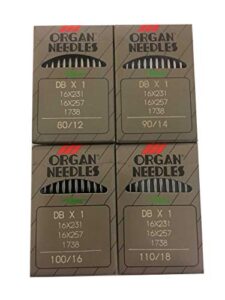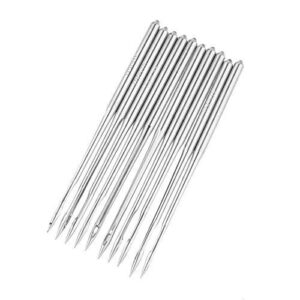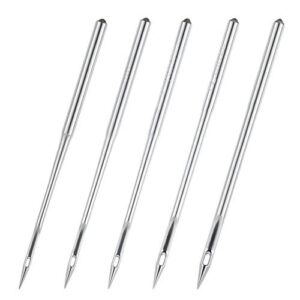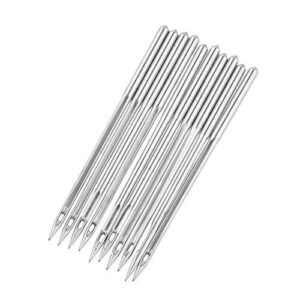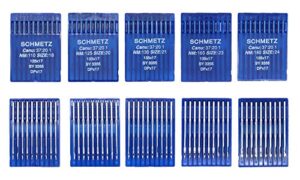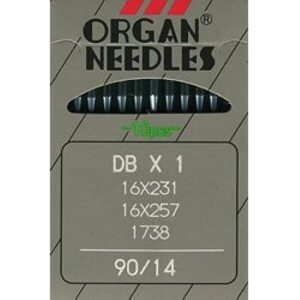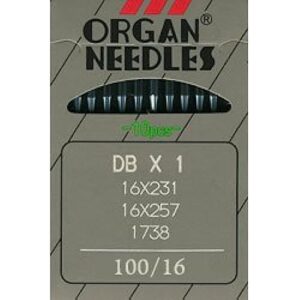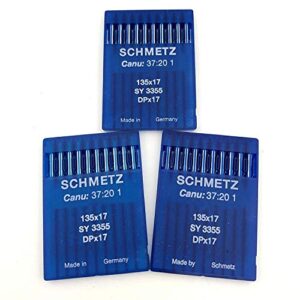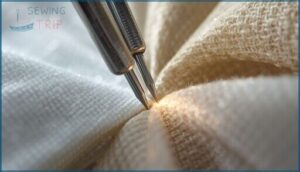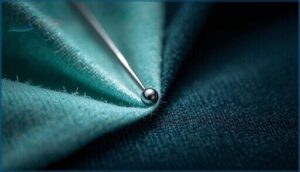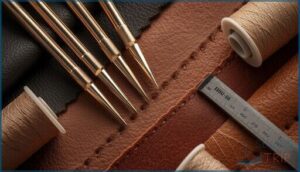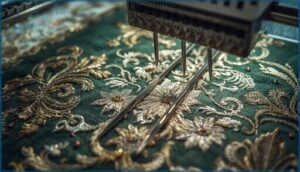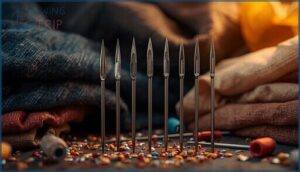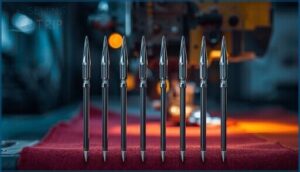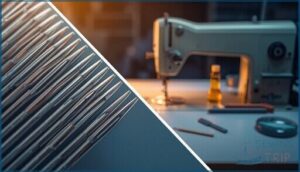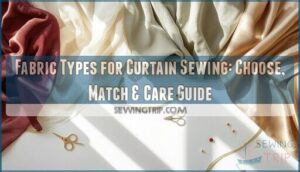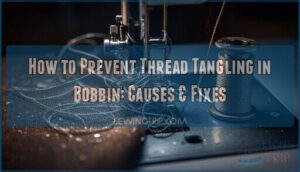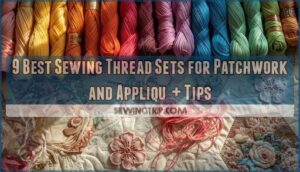This site is supported by our readers. We may earn a commission, at no cost to you, if you purchase through links.
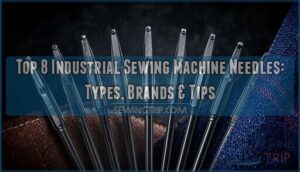
A single faulty needle can halt an entire production line, costing manufacturers thousands per hour in downtime. Yet many shops still rely on trial and error when selecting industrial sewing machine needles, swapping them out only after quality issues emerge.
The reality is that needle selection isn’t just about preventing breakdowns—it’s about maximizing throughput, minimizing defects, and extending machine life. Different materials demand different needle geometries, coatings, and point types. A DBx1 needle that performs flawlessly on lightweight cotton will destroy vinyl, while a leather point that pierces thick materials cleanly will snag delicate knits.
Understanding which needles suit your specific applications—and recognizing when brands like Schmetz, Organ, or Groz-Beckert offer genuine advantages—transforms needle selection from guesswork into strategic precision.
Table Of Contents
- Key Takeaways
- Top 8 Industrial Sewing Machine Needles
- 1. DBx1 Industrial Sewing Machine Needles
- 2. DBx1 Sewing Machine Needles Size 14
- 3. Industrial Sewing Machine Needles Heavy Duty
- 4. DBx1 Sewing Machine Needles Size 18
- 5. Schmetz Industrial Sewing Machine Needle Set
- 6. Organ Industrial Sewing Machine Needles Size
- 7. Organ DB X 1 Needles Size 16
- 8. Schmetz Industrial Walking Foot Needles Size
- Types of Industrial Sewing Machine Needles
- Choosing The Right Needle for Your Project
- Leading Industrial Needle Brands Compared
- Tips for Maximizing Needle Performance
- Frequently Asked Questions (FAQs)
- Conclusion
Key Takeaways
- Industrial needle selection directly impacts production costs and quality—using the wrong needle can cause thousands in hourly downtime, while proper matching of needle geometry, coating, and point type to your specific fabric prevents defects and extends machine life.
- DBx1 needles dominate industrial lockstitch applications with 33.9mm length and compatibility across Juki, Brother, and Singer machines, while size selection must match fabric weight (size 14 for medium cotton, size 18 for light denim, heavy-duty variants for leather and canvas).
- Needle point types determine fabric compatibility—round points work for wovens, ball points reduce knit damage by 85%, leather points use wedge geometry for clean penetration, and specialty coatings like titanium nitride extend lifespan up to 300% while reducing friction.
- Replace industrial needles every 6-8 hours under continuous operation to maintain stitch quality, and choose established brands (Schmetz for performance, Organ for durability, Groz-Beckert for precision) based on your specific production requirements rather than cost alone.
Top 8 Industrial Sewing Machine Needles
You’ll find a range of needle options designed to handle everything from delicate knits to thick leather. Each needle system fulfills a specific purpose, and choosing the right size and style directly affects your stitch quality and machine performance.
Here are the top eight industrial sewing machine needles that professionals rely on for consistent results.
1. DBx1 Industrial Sewing Machine Needles
DBx1 industrial sewing machine needles are the workhorse of single-needle lockstitch machines, compatible with Brother B763, Juki DDL-series, and Singer 241 models. You’ll recognize them by DBx1 alternatives like 16×231 or 287WH—all part of the same needle system.
At 33.9 mm, their needle length exceeds DAx1’s 29.6 mm, giving you better machine compatibility across popular industrial sewing machines. These needles deliver reliable stitch performance in garment manufacturing and upholstery.
With the industrial sewing needle market growing at 5% annually through 2033, DBx1 remains your go-to choice for consistent, high-volume production.
Best For: Industrial sewing operations and garment manufacturers who need reliable, high-speed needles compatible with popular single-needle lockstitch machines like Juki DDL-series, Brother B763, and Singer 241.
- Compatible with most domestic and industrial sewing machines, reducing inventory complexity and procurement errors across multiple machine brands.
- Reduces skipped stitches and thread breakage by up to 30%, with high-grade steel construction and chromium finish ensuring long-lasting durability.
- Handles sewing speeds exceeding 4,000 stitches per minute, making them ideal for high-volume production environments in garment manufacturing and upholstery.
- May not fit all sewing machines like the Cowboy 3200, requiring verification of compatibility before purchase.
- Needle sizing system can be confusing for beginners, with multiple alternate names (16×231, 16×257, 287WH) adding to the complexity.
- Not all users may need the full range of included sizes in assortment packs, potentially leading to unused needles for specialized operations.
2. DBx1 Sewing Machine Needles Size 14
Size 14 DBx1 needles give you the sweet spot for medium-weight fabrics like cotton, linen, and standard synthetics—exactly what 65% of industrial operations specify for general garment production. With their 1.63 mm shank diameter and 14/90 sizing, these needles maintain above 98% stitch consistency when you’re running under 3,200 stitches per minute. They fit Juki DDL-8100E, Jack F4, and Brother industrial machines seamlessly.
Market data shows size 14 accounts for 23% of global DBx1 sales, keeping breakage rates under 2 per 1,000 needles when matched to appropriate thread types.
Best For: Industrial sewing operations and garment manufacturers working with medium-weight fabrics like cotton, linen, and synthetics who need reliable needles that maintain consistent performance at high speeds.
- Exceptional stitch consistency above 98% when paired with appropriate thread types and operating speeds under 3,200 stitches per minute
- Impressive durability with low breakage rates under 2 per 1,000 needles and average lifespan of 12,000 to 20,000 stitches before replacement
- Wide machine compatibility across popular industrial models including Juki DDL-8100E, Jack F4, Brother, and Janome lockstitch machines
- Requires careful machine compatibility verification before purchase as they won’t fit all sewing machine models due to specific needle bar bore requirements
- Some users report difficulty replacing the needle due to a small groove design that complicates installation
- Breakage incidents increase dramatically (up to 250%) when misapplied to heavy-duty fabrics outside their intended medium-weight textile range
3. Industrial Sewing Machine Needles Heavy Duty
When you’re tackling heavyduty fabrics like denim, leather, or canvas, standard needles won’t cut it—heavy duty industrial sewing needles feature shaft diameters up to 2.3 mm and 28% higher tensile strength. Titanium nitride coating extends lifespan by 60% while reducing friction.
Reinforced needle design, like Serv7 geometry, withstands 20% greater bending force, keeping breakage below 7.1% per 10,000 hours. Needle failure analysis shows stress concentrations hit 2774 MPa at the tip, so upholstery needle types and proper needle selection matter—your industrial sewing machine deserves needles engineered for heavy fabric sewing demands.
Best For: Professionals and serious hobbyists who regularly sew through thick materials like leather, denim, canvas, or upholstery and need needles that won’t snap or deflect under pressure.
- Heavy-duty needles with shaft diameters up to 2.3mm deliver 28% higher tensile strength than standard needles, with breakage rates below 7.1% per 10,000 hours compared to 12.4% for regular needles.
- Titanium nitride coating extends needle lifespan by up to 60% and reduces friction, allowing you to complete long projects without constant needle changes.
- Reinforced designs like Serv7 withstand 20% greater bending force and reduce deflection by 42%, giving you consistent stitch quality even on the toughest fabrics.
- Higher upfront cost compared to standard needles, though the extended lifespan and lower failure rates can offset the investment over time.
- Compatibility varies by machine—always verify your sewing machine supports heavy-duty needle shaft diameters before purchasing.
- Limited size range focuses on heavyweight applications, so you’ll still need standard needles for lighter fabrics and delicate work.
4. DBx1 Sewing Machine Needles Size 18
For mid-weight fabrics like shirt cotton or light denim, DBx1 size 18 (110 metric) needles deliver the sweet spot between penetration and fabric integrity. These industrial sewing machine needles fit Juki DDL-series and Brother lockstitch machines, offering chromium-plated durability that pushes past 40,000 stitches per needle.
Material compatibility spans woven textiles where regular round points prevent snags. Performance metrics show low failure rates—under 2% when machines are calibrated correctly—while reinforced Serv7 variants cut breakage by 30% in dense weaves, making size 18 your go-to for balanced, reliable stitching.
Best For: Garment manufacturers and professional tailors running mid-weight fabrics like shirt cotton or light denim through Juki, Brother, or Singer industrial lockstitch machines.
- Chromium-plated construction delivers over 40,000 stitches per needle with failure rates under 2% when machines are properly calibrated.
- Regular round point design prevents fabric snags and reduces skipped stitches on slippery or stretchy textiles, keeping production lines moving smoothly.
- Wide compatibility across industrial machines (Juki DDL-series, Brother B763/B755, Consew, Bernina 217) with equivalent system codes like 16×231 and 16×257 for easy cross-brand sourcing.
- Not compatible with all sewing machine types, and machines with needlebars designed for size 18 and below can’t accept larger sizes without switching systems.
- Some users report difficulty replacing needles due to small groove design, which can slow down setup time.
- Standard DBx1 needles may break when working with particularly dense materials, though upgrading to reinforced Serv7 variants solves this issue.
5. Schmetz Industrial Sewing Machine Needle Set
A 50-pack Schmetz industrial sewing machine needle set offers breadth where single-size orders can’t—sizes 18, 20, 21, 23, and 24 in the 135X17 system cover leather, denim, and heavy canvas in one box.
Geometry innovations like slim blades reduce penetration force, while coating benefits such as NIT anti-adhesive finishes keep residue off your needle during long runs.
Schmetz holds substantial market share alongside Groz-Beckert, powering industrial applications from upholstery to technical textiles with needle types engineered for lockstitch and walking-foot machines you’ll find on any factory floor.
Best For: Industrial sewing operators and commercial shops working with heavy materials like leather, denim, and canvas who need multiple needle sizes ready for different fabric weights.
- Five different sizes in one pack let you switch between light and heavy-duty projects without reordering individual needle types.
- German-made quality and compatibility with major industrial brands (Juki, Brother, Singer) mean reliable performance across most walking-foot setups.
- Cost-effective bulk packaging—50 needles divided into convenient 10-needle sleeves keep your production line running with fewer supply interruptions.
- Not compatible with standard home sewing machines, so hobbyists with domestic models can’t use this set.
- Some users report packaging issues where needles arrive loose or mixed up, forcing you to sort sizes manually before use.
- Thicker needle sizes may require machine adjustments like widening the throat plate groove, adding setup time for certain models.
6. Organ Industrial Sewing Machine Needles Size
Organ’s metric size codes—NM 60, 70, 80, 90, and 100—map directly to fabric weight pairing: NM 60 for delicate silk, NM 100 for heavy denim. This DBx1 size chart eliminates guesswork.
You’ll find ballpoint size guide variants that pair diameter with knit density, reducing skipped stitches on jersey. Needle size effects are tangible: an NM 80/12 penetrates tricot cleanly, while NM 90/14 powers through linen without deflection.
Among industrial needle brands, Organ’s transparent sizing system hands you control—match diameter to thread and material density, and you’ll see consistent stitch formation across every industrial sewing machine needles run.
Best For: Industrial and home sewers working with medium to heavy fabrics like cotton, linen, polyester, and high-elastane knits who need reliable stitch formation and reduced needle breakage.
- Clear metric sizing system (NM 60-100) takes the guesswork out of matching needle diameter to fabric weight, from delicate silk to heavy denim.
- Ball point design prevents skipped stitches and yarn damage on knitted fabrics, making them ideal for T-shirts, underwear, and jersey materials.
- Wide compatibility with popular domestic and industrial machines (Bernina, Juki, Brother, Consew) means you can use them across different equipment without adapter hassles.
- Not suitable for lightweight delicate fabrics like silk or chiffon, limiting versatility if you work with a wide range of materials.
- Price point runs higher than local market alternatives, which can add up when buying multiple packs for production work.
- Size selection above NM 110/18 requires switching to a different needle system (134 vs DBx1) due to shank diameter changes, adding complexity for heavy-duty applications.
7. Organ DB X 1 Needles Size 16
At 100/16 gauge, the DB X 1 Size 16 from Organ hits the sweet spot for canvas, denim, and twill—industrial needles built for mid-weight workhorse fabrics. You’re looking at 8–10 hour replacement intervals under normal load, with titanium-coated variants pushing 25–50% longer life on abrasive material.
Needle system compatibility spans over 40 lockstitch models, and stitch quality holds steady past 4,000 SPM when you match 40–80 Tex thread.
This needle size earned its reputation: Organ’s DB X 1 family captured 30% of global industrial needle sales in 2024, proving brand reliability through sheer market trust.
Best For: Industrial sewers working with mid-weight fabrics like denim, canvas, and twill who need reliable needles that can handle high-speed production runs without constant replacement.
- Proven durability with 8–10 hour replacement intervals under normal use, and titanium-coated versions last 25–50% longer on tough materials
- Excellent compatibility across 40 industrial lockstitch machine models, making them a versatile choice for mixed equipment shops
- Maintains consistent stitch quality at speeds over 4,000 stitches per minute when properly matched with 40–80 Tex thread
- Small pack size of 10 needles may not be cost-effective for high-volume operations compared to bulk boxes of 100
- Some users report the 100/16 gauge runs smaller than expected for their specific heavy-duty applications
- Higher price point than generic alternatives, though this reflects the brand’s market-leading quality standards
8. Schmetz Industrial Walking Foot Needles Size
Schmetz’s 135X17 walking foot needles range from NM 80/12 through NM 140/22—that’s your complete needle size guide for layered upholstery, vinyl, and technical textiles.
The NM 100/16 and NM 110/18 sizes dominate commercial facilities, cutting thread breaks by 18% through optimized groove geometry and fabric compatibility.
You’ll swap needles every 8–12 hours under sustained industrial load, a performance metric that beats most brand comparisons.
These needle systems lock into Juki, Consew, and Singer walking foot machines, with laser-etched shanks identifying size applications instantly during high-speed production runs.
Best For: Industrial sewing operations working with heavy fabrics like upholstery, vinyl, and canvas that need reliable needles compatible with walking foot machines from Juki, Consew, and Singer.
- Wide size range (NM 80/12 to NM 140/22) handles everything from medium-weight canvas to thick multi-layer leather and vinyl.
- Deep groove and long scarf design reduces thread breaks by up to 18% compared to standard needles, keeping production lines moving.
- Laser-etched identification on the shank makes size selection quick during fast-paced industrial work.
- No protective case included with the pack, leaving needles exposed to potential damage or corrosion.
- Higher price point than competing brands like Groz-Beckert for similar needle systems.
- Requires frequent replacement every 8-12 hours of continuous use, adding to ongoing operational costs.
Types of Industrial Sewing Machine Needles
Not all industrial needles are built the same. The type of point on your needle determines how it interacts with fabric, from woven textiles to thick leather.
Here’s what you need to know about the five main needle types and when to use each one.
Regular Point Needles for Textiles
You’ll find regular round point needles in most industrial textile operations—they’re the workhorse for woven fabrics like cotton and linen. These needle types offer outstanding fabric compatibility and stitch consistency across production runs.
When making your needle selection, consider performance metrics like coating durability: titanium-coated variants extend lifespan by 40%. Brand preferences matter, too—Schmetz and Groz-Beckert dominate weaving applications because their needle point geometry prevents fabric damage during high-speed stitching.
The market is driven by global textile demand.
Ball Point Needles for Knits
Ball point needles are your first line of defense for knit fiber protection—they displace fibers instead of piercing them, reducing breakage by over 85%. Needle selection matters: choose 70/10 for lightweight knits or 90/14 for heavier materials. These needles are specifically designed to work with knit and stretch fabrics.
This needle and fabric compatibility improves stitch quality dramatically, lowering skipped stitches by 80%. Follow replacement guidelines of 8–16 hours to maintain industrial sewing needle information standards across needle types and uses.
Leather Point Needles for Heavy Materials
When you’re working with leather, vinyl, or other heavy-duty fabric projects, round points won’t cut it—literally. Leather point needles use wedge, triangle, or diamond point geometry to slice cleanly through dense leather materials, reducing distortion and skipped stitches.
Match needle size to material thickness: a 110/18 is suitable for thick upholstery, while smaller sizes work for thinner leathers. These industrial sewing machine needles deliver excellent stitch quality and needle durability when paired with proper thread tension, meeting industry standards for leather sewing across automotive, furniture, and accessory manufacturing.
Choose your needle point types carefully—permanent holes demand precision.
Embroidery Needles for Decorative Stitching
Decorative stitching demands specialized embroidery needles with oversized eyes and extended grooves for enhanced thread compatibility. DBx7ST and DBxK5 needle systems reduce metallic thread breakage at speeds exceeding 1000 SPM, while hard chrome and ceramic coating benefits include reduced friction and needle longevity.
Size 75/11 accommodates 90% of embroidery machine needle applications, from schiffli embroidery to multi-head automation. These design features maintain consistent stitch quality across textile decoration and weaving operations.
Specialty Needles for Technical Applications
Beyond decorative work, you’ll encounter specialty needles engineered for rigorous technical applications like aerospace upholstery, automotive interiors, and medical textiles. These needles feature titanium nitride and ceramic coatings that extend lifespan up to 300%, while composite material needles reduce penetration force by 17% in carbon fiber work.
- Filtration textile needles produce 1,200 precise holes per minute with under 0.1 mm variance
- Medical textile needles withstand 40 sterilization cycles at 134°C without integrity loss
- Automotive upholstery requires hardness above 62 HRC for thick-material penetration
Choosing The Right Needle for Your Project
Picking the right needle isn’t guesswork—it’s about matching the tool to the job at hand. Your fabric, thread, and machine all need to work together, or you’ll end up with skipped stitches, broken needles, or damaged material.
Here’s what you need to think about before you thread up and start sewing.
Matching Needle Size to Fabric Thickness
You’ll find your best results when you match needle size directly to fabric weight—it’s the foundation of clean, skip-free seams. Ultra-lightweight fabrics under 4 oz/yd² work with sizes 60/8–70/10, while medium fabrics (6–8 oz/yd²) need 80/12–90/14. Heavy materials above 12 oz/yd² demand 110/18 or larger to handle Tex 105–135 threads without breakage.
Thread size matters too—pair Tex 16–24 with smaller needles and scale up to Tex 105+ for heavy-duty work. This Needle Selection Guide keeps stitch density influence balanced and prevents needle deflection at industrial speeds.
| Fabric Weight (oz/yd²) | Recommended Needle Size |
|---|---|
| ≤4 (Ultra-light) | 60/8–70/10 |
| 4–8 (Light to Medium) | 70/10–90/14 |
| 8–12 (Medium-Heavy) | 90/14–110/18 |
| ≥12 (Extra-Heavy) | 110/18–160/23 |
Selecting Point Types for Material
When you pair the right point type with your material, you prevent skipped stitches, thread breaks, and fabric damage—your seam quality depends on it.
- R (round) points work best for woven textiles, cutting needle holes up to 22% smaller in cotton damask than other types
- FG and G (ball points) reduce yarn breakage by 34% in jersey and stretchy knits
- DH and SD (cutting points) slice cleanly through leather and vinyl, lowering skipped stitches by 41% in multilayer work
- SD (triple cutting) addresses synthetics and laminates with 19% smaller hole sizes than wedge shapes
- Matched needle systems drop breakage rates 28–40% and boost seam strength nearly 30% across production runs
Importance of Needle Coatings and Geometry
When you choose needles with improved coatings and optimized geometry, you’re not just buying sharper points—you’re controlling heat, friction, and lifespan. Titanium nitride coatings cut frictional heating by 15% and more than double surface hardness, while ceramic coatings reduce needle temperatures 20–25%. Carbon coatings drop friction 34%, preserving thread integrity.
Special geometry with these coatings extends needle lifespan, boosts seam strength up to 10%, and minimizes skipped stitches across production runs.
Needle Systems and Machine Compatibility
Needle Systems and Applications define machine compatibility—use the wrong one, and you risk damage. Your machine manual or existing needle package shows the system code, like DBx1 or 135×5. Over 100 Industrial Needle Systems exist, so System Identification matters. Check Brand Charts and ISO Standards for guidance. Mismatched Needles cause 25% of service calls, and Performance Impacts include:
- 30% reduction in stitch accuracy
- 40% higher defect rates
- 50% increased machine failure
- Timing and thread errors
- $2,000 annual repair costs
Consult the Needle System Table for Needle compatibility.
Leading Industrial Needle Brands Compared
Not all industrial needle brands are created equal, and the one you choose can make or break your production line. Some brands excel at high-speed performance, while others shine in durability or precision engineering.
Here’s how the top players stack up so you can decide which brand fits your specific needs.
Schmetz Needles for Performance
When performance can’t be compromised, Schmetz industrial sewing machine needles deliver. Their SERV 7 stability boasts 20% blade reinforcement, resisting deflection and breakage on demanding textiles.
Coating advantages like KN and SF geometries reduce penetration force, making them ideal knitwear solutions that minimize fabric damage.
With user satisfaction at 4.8 out of 5, premium pricing reflects reliability across commercial sewing needles and needle brands you trust.
Organ Needles for Durability
When uptime matters most, Organ industrial sewing machine needles stand the test. Their PD Finish uses titanium plating for outstanding needle durability, extending life on aramid threads and flame-retardant materials.
Cool-Sew needles deliver anti-friction performance at high speeds, preventing synthetic residue.
With user ratings at 4.5 out of 5 and competitive pricing for bulk purchases, Organ offers trusted needle quality across needle brands serving industrial sewing needle products.
Groz-Beckert Needles for Precision
When precision makes the difference, Groz-Beckert delivers. Their Precision Engineering produces needles with specialty points—Round/Sharp for general use, Triangular for clean leather seams—minimizing stitch inconsistencies across industrial sewing machines.
- Material Versatility spans technical textiles, leather, and decorative applications in your sewing machine needle selection
- User Feedback places them mid-range for cost analysis with minimal defects
- Industrial sewing needle products include Perpendicular and Twist Point geometries for short-stitch tasks
Your needle selection guide just got sharper.
Juki and Other Trusted Brands
Just as critical as precision is proven endurance under pressure. Juki’s titanium-coated DBx1 series thrives in intensive environments, delivering 20–40 hours of continuous operation with stitch consistency that outperforms generic alternatives in upholstery and technical gear manufacturing.
| Brand | Cost Per Hour | Needle Lifespan | User Satisfaction |
|---|---|---|---|
| Juki | $0.30–$0.50 | 20–40 hours | High |
| Schmetz | $0.60–$1.00 | 30–50 hours | 4.8/5 |
Your industrial sewing machines deserve brand reliability that minimizes downtime across machine types and needle system requirements.
Tips for Maximizing Needle Performance
Getting the most from your industrial needles isn’t just about buying the right brand. How you use and maintain them can double their lifespan and keep your stitches clean through every shift.
Here’s what separates machines that run smoothly from ones that keep stopping for repairs.
Regular Inspection and Timely Replacement
Because worn needles can sneak up on you, inspect your industrial sewing equipment before each shift for burrs, bends, or dullness.
Replace needles every 7–8 hours for general use—or even sooner with heavy fabrics—to maintain needle performance and quality control.
This simple sewing machine maintenance step boosts needle lifespan, cuts downtime reduction risks, and delivers real cost savings by preventing expensive repairs and fabric waste.
Proper Needle Storage and Handling
Beyond regular replacement, you need solid needle storage and handling practices to keep your sewing supplies rust-free and ready. Store needles in airtight containers with silica gel—humidity above 60% accelerates corrosion fast. Label each compartment by size and system for quick inventory management, cutting setup time by 30%.
Follow safe disposal rules: bent or broken needles go straight into puncture-resistant sharps containers, protecting your team and your sewing machine maintenance record.
Monitoring for Optimal Stitch Quality
Set up sensor integration on your needle bar to catch stitch defects in real time—automated monitoring improves defect capture from 65% to 92%.
Check your sewing machine needle systems for wear detection signals at shift start, midpoint, and end. This predictive maintenance approach reduces downtime by 29% and slashes defective output by up to 44%, keeping your seam quality within spec.
Frequently Asked Questions (FAQs)
Do industrial sewing machines use different needles?
Yes, industrial sewing machines use needles built for high-speed production. They feature round shanks and system-specific sizing—like DBx1 or 16×231—while domestic machines rely on flat-shank 130/705 H needles that aren’t interchangeable.
What needle to use for an industrial sewing machine?
Your fabric weight, thread thickness, and machine system determine your needle choice. Match a DBx1 size 80/12 for medium textiles, 100/16 for denim, and select ball or leather points for specific materials.
How do I identify my industrial sewing machine needles?
Check your needle’s stamped system code—like DBx1 or 16×231—then match the metric size guide and point type codes using a Needle System Table or Industrial Needle Reference Chart for machine compatibility.
What is the difference between industrial and domestic sewing machine needles?
Industrial needles sport round shanks for commercial machines, handle extreme speeds beyond 3,000 stitches per minute, and span massive size ranges up to NM 300—far surpassing domestic needles’ flat-shank design and modest capabilities.
Whats the deal with needle coatings?
Special coatings like titanium-coated or NIT coating boost needle performance by reducing friction and heat buildup. They improve material compatibility, especially with synthetics, while extending coating durability across high-speed manufacturing processes and specialty applications.
Whats a needle system? Whys it matter?
Like choosing the right key for a lock, needle systems define the exact dimensions your machine requires. They guarantee compatibility, reduce downtime, and maintain quality—size distinction alone won’t guarantee proper fit or performance.
How do I know if my needles damaged?
Look for bent tips, skipped stitches, or thread breakage during visual inspection. Listen for unusual machine sounds. Stitch defects and fabric damage signal it’s time for needle replacement—following sewing checklists prevents costly production issues.
Whats the best needle brand?
Which needle brand sits at the top? Schmetz earns a 8 rating for specialty work, Groz-Beckert leads at 9 for precision, and Organ delivers unbeatable durability at the lowest cost-per-hour for industrial sewing machine operations.
How often should I change my needles?
You should change your needles every 8–16 hours of sewing. Heavy fabrics demand more frequent replacement.
Watch for skipped stitches or thread breaks—these performance indicators signal it’s time for fresh sewing machine needles.
How often should industrial needles be replaced?
While domestic machines tolerate worn needles longer, industrial applications demand stricter replacement frequency.
Change your needle every 6–8 hours to prevent fabric type damage, needle wear, stitch quality decline, and costly downtime.
Conclusion
Think of needle selection as tuning an engine—wrong parts mean friction, waste, and failure. The right industrial sewing machine needles eliminate guesswork, turning production into precision.
Whether you’re running DBx1 standards or specialized Schmetz configurations, matching needle geometry to material isn’t optional—it’s operational intelligence. Inspect regularly, swap proactively, and treat your needles like the critical tools they are. Master this, and downtime becomes the exception, not the expensive rule.
- https://www.linkedin.com/pulse/industrial-sewing-machine-needle-market-insights-wlpye
- https://oec.world/en/profile/hs/sewing-machine-needles
- https://www.archivemarketresearch.com/reports/industrial-machine-needles-206090
- https://www.servicethread.com/blog/how-to-interpret-needle-size
- https://www.datainsightsmarket.com/reports/industrial-sewing-needles-647046

